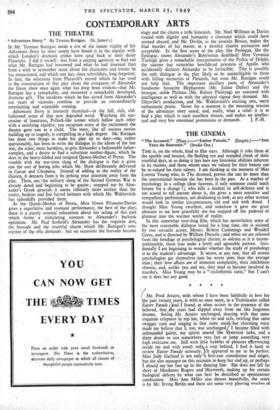CONTEMPORARY ARTS
THE THEATRE
"Adventure Story." By Terence Rattigan. (St. James's.)
IF Mr. Terence Rattigan needs a test of the innate vitality of his Adventure Story he must surely have found it in the alacrity with which London's dramatic critics have sped' back to their dusty Plutarchs. I did it myself : less from a carping cltriosity to find out what Mr. Rattigan had borrowed and what he had invented than from a wish to remember more about the characters and events he has resuscitated, and which one has, since schooldays, long forgotten. In fact, the selections from Plutarch's record which he has used in the construction of this play about the conquests of Alexander the Great show once again what has long been evident—that Mr. Rattigan has a remarkable, and moreover a remarkably developed, dramatic gift. The incidents which he has sieved from Alexander's ten years of victories combine to provide an extraordinarily entertaining and enjoyable evening.
Adventure Story is intensely theatrical—in the full, rich, old- fashioned sense of that now degraded word. Watching the suc- cession of luxurious, Pollock-like scenes which follow each other with a satisfying rapidity, you recapture some of the excitement the theatre gave you as a child. The story, like all success stories building up to tragedy, is compelling in a high degree. Mr. Rattigan has done two things to make his play up to date—one, rather questionably, has been to write the dialogue in the idiom of the late war, the other, more harmless, to give Alexander a fashionable father- complex, and a desire to find a substitute mother-figure, which he does in the heavy-lidded and resigned Queen-Mother of Persia. The trouble with the war-time slang of the dialogue is that it gives one the sort of boring jolts which Mr. Shaw deliberately delivered in Caesar and Cleopatra. Instead of adding to the reality of the illusion, it detracts from it by jerking your attention away from the play. Then, too ,'the military slang of the Second German War is already dated and beginning to be quaint ; snapped out by Alex- ander's Greek generals it seems infinitely more archaic than the tunics, buskins and fine furred helmets with which Mr. Wakhevitch has splendidly provided them.
As the Queen-Mother of Persia, Miss Gwen Ffrancon-Davies gives a superlative and resonant performance, the best of the play; there is a purely oriental exhaustion about her acting of this part which forms a stimulating contrast to Alexander's barbaric optimism. Mr. Paul Scofield's Alexander has the requisite zest, the bravado and the youthful charm which Mr. Rattigan's con- ception of the role demands : but on occasions the bravado became
stagy and the charm a trifle kittenish. Mr. Noel Willman as Darius treated with dignity and hdmanity a character which could have seemed absurd, and Mr. Devlin, as the assassin Bessus, makes the final murder of his master in a derelict chariot persuasive and acceptable. In the first scene of the play (the Prologue, like the Epilogue, shows Alexander's Babylonian deathbed) Miss Veronica .Turleigh gives a remarkable interpretation of the Pythia of Delphi, the sinister but somewhat bewildered priestess of Apollo who accidentally declares Alexander to be invincible. This is possibly the only dialogue in the play likely to be unintelligible to those with failing memories of Plutarch, but even Mr. Rattigan could not help that. The important ancillary parts of Alexander's handsome favourite Hephaeston (Mr. Julian Dallas) and the brusque, noble Philotas (Mr. Robert Flemyng) are executed with
• intelligence as well as with the physical vigour they demand. Mr. Glenville's production, and Mr. Wakhevitch's exciting sets, merit enthusiastic praise. Never for a moment is the mounting tension of the adventure story eased, and, really, what a relief it is to find a play which is such excellent theatre, and makes no intellec- tual and very few emotional pretensions or demands. J. P.-H.














































 Previous page
Previous page